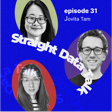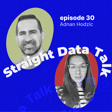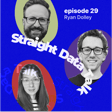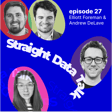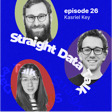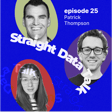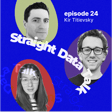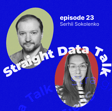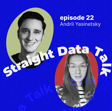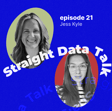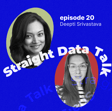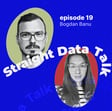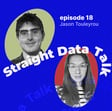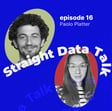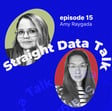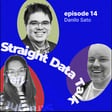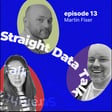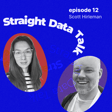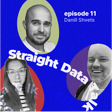Introduction of Tomas Inutveld and Tasman Analytics
00:00:01
Speaker
Hi folks, welcome to the Straight Data Talk podcast. This is Tomke and Julia here today with our guest, Tomas Inutveld. um Hello. Tomas, you've been um ah founder, owner of Tasman Analytics. Super happy to to have here today.
00:00:22
Speaker
um Would you do us the honor of a quick introduction? Oh, sure. Absolutely. And it's really nice to be here as well, Julian. I'm by the invitation. I'm Thomas. I run Tasman. We're 20 people.
00:00:33
Speaker
We exist because there's a couple of problems in the data space that we would really like to solve. And one of them is that we think most data projects fail. And reason that most data projects fail is because they fail at the business value layer. And so Tasman exists to operate it as a end-to-end team coming in helping you and your data team out in six to nine months to really get a data capability set up that works for you make sure your marketing team no longer downloads data into excel and making sure you got a central proper governance layer and many other things that we can talk about later but my own background is as a physicist having worked in belgium london and now being based in amsterdam ah with my team split between the uk and amsterdam for those historical reasons it's very nice to be here dunkey
Nature Conservation and Data: Tomas' Dual Passions
00:01:18
Speaker
Yeah, fantastic. and And there is one particular thing I i saw about you um when I looked on your on your LinkedIn profile, right? And so um you recently partnered with MotherDog, the the cloud DocDB solution, but I saw that you are actually able to distinguish many more docs than that. Can you can you explain that that link? ios
00:01:49
Speaker
I have a very fond, um i shall I say, ah love of of of nature and being out there. And so a couple of years ago, i did the full sort of what in the Netherlands they call fauna protection and conservation. And by the way, also a hunting course. so yeah It all fits together.
00:02:07
Speaker
i'm I'm not a hunter. I've never shot an animal or or or um ah hunted an animal in my life, but I was very interested in that side of of of culture. and and How do we get food? What's what's involved with animal um conservation? How do you, for instance, maintain a healthy balance of predators versus ah prey versus other animals on, say, Dutch farm, but also on, say, a Scottish farm or a New Zealand farm? And that's relevant because
00:02:38
Speaker
I spend quite a bit of time in Scotland, got a family connection in Scotland, and my wife is from New Zealand. So those are cultures that are rather more agrarian than the cities and within which I've always lived and and done my business. And I thought that getting a little bit more of that ah pragmatic real-world experience is is very important.
00:02:57
Speaker
They also teach you things like um ah gun safety. Those really important stuff around. well Well, if you do find yourself in a position where... ah you You have to um ah ah grab a shotgun to do clay pigeon shooting or something like that. What is the right way to do it and what is definitely the wrong way to do it? And I can tell you that there's some nasty surprises sometimes that you find there
Analogies in Data: Clay Pigeon Shooting and Strategic Planning
00:03:18
Speaker
well. Okay, very interesting.
00:03:19
Speaker
Any connections to the like analogies that you draw or or or lessons to your data life? Oh man, it's, it's ah well, if you do, the the one thing I got really good at in the course was clay pigeon shooting. And one of the things you have to do when doing clay pigeon shooting is you have to sort of know where the clay is shooting to, where the clay is moving to, rather than trying to aim for the clay itself. You try to envision what the trajectory is.
00:03:43
Speaker
And of course, that's the sort of skill that you need day-to-day life because that's applicable in business as much as it is in, say, drone warfare or so, right? So I did something that I'm sure well ah for will be relevant later.
00:03:56
Speaker
bill Yes, you you also say learn how to recognize 20 different types of duck and whether they're sea duck or whether they're land duck or whether they're kind of ah duck debts that kind of stay at the bottom of the lake until they're fed or whether they're duck that dive straight down. And that's really useful when walking the dog here in the morning in Harlem, although there's only really one type of duck we see here and possibly some it some what they call a Nelgans in Dutch, which is a very ugly kind of duck.
00:04:23
Speaker
But let's not talk about ugly ducks today. but No, exactly, exactly. And so now it's 21 ducks with the the mother duck partnership. 21 ducks with the mother duck partnership there as well, which is excellent. We're excited about that one.
00:04:35
Speaker
Can you say that again, Julia? Sorry. I now wonder which one is ugly. Oh, no, there's something called a Nelkans. I don't even know what t but the sort of English term for it is, but it is, well, it's called a geese in Dutch, but it's actually a duck. It's quite large and it has really weird rims around the eyes. And when you see them, you sort of go like, well, where are your feathers, mate?
00:04:56
Speaker
and This is a sort of weird, ugly duckling.
00:05:02
Speaker
It's good one. Yes.
The Importance of Data Modeling in Business Value
00:05:04
Speaker
So one, um maybe to start this off right, I remember, I i think I once saw you talk about um ah data modeling. And i the reason that stuck with me is that I found it very refreshing to hear someone on like a more technical meetup or conference talk about something as boring and old fashioned as ah data modeling and why that actually provides value. You're triggering me, Demki, but yes.
00:05:38
Speaker
but But can you say, like I think that that's also what work drove you at Tasman, right? like You're trying to bring value to businesses. And I think part of what you do is doing that through proper data modeling.
00:05:53
Speaker
Yeah, it's interesting because the d it's definitely a point in the industry, and and I'm happy that a lot more people are talking about at this point. There's a lot of attention to, let's just call it vendor technology.
Common Reasons for Data Project Failures
00:06:05
Speaker
ah People getting really excited about ah data warehouses, and for a good reason, people getting really excited about ah data modeling frameworks, as in orchestration suites like dbt, and whether or not they will be ah purchased by other big companies and so on and so on. People get really excited by by ETL pipelines or ELT pipelines.
00:06:26
Speaker
um But what I've always thought was that
00:06:30
Speaker
A lot of that stack, a lot of the sort of technology that people talk about in that point is quite commoditized at this point and it's fairly easy to set up. As a matter of fact, where say five, six years ago, we would have taken a few months to start up a data stack from scratch. We can now deploy everything in one single sprint and that's a little bit of sort of R&D and development on that. But just tell you as well about how much that that part of the stack has been commoditized and how easy it is to set up.
00:06:56
Speaker
And so people think, oh, ah we're we're done now. It's very easy to set up a data stack from scratch, right? But that's not quite true because we see that when data projects fail, One reason they fail is because they don't really understand what they need to assist the business with. So they just kind of reduce themselves to answering tickets from the product team and a marketing team without really thinking strategically about how data can help a business grow.
00:07:19
Speaker
But the other reason why it typically fails is because all of a sudden people realize that, no, you can't really grow a data model with a loose collection of scripts without an overarching overarching architecture of what you're actually trying to build.
00:07:32
Speaker
And that architectural information modeling has often been a bit of an afterthought. So the short version is that um data modeling is a less under illuminated, it's not really studied, it's not really part of the big curricular that you do when you are studying data and engineering or or or or data science in sort of classic way.
00:07:50
Speaker
Analytics engineering gets you a bit closer, but even there, I find that the typical frameworks that people are get excited about, whether it's Data Vault or ah whether whether it's Gimbal style star schema modeling and so on, don't really solve the big issues that we see within our clients where you have to build one data model that hasn't but doesn't have to be replaced every few months when ah your questions change. now You want to build one data model that scales with the business.
00:08:17
Speaker
And that's why at Tasman, We have always, from the very start, put a huge amount of focus and attention and care into making sure that there's just anything we want our clients to take away from our engagement.
00:08:30
Speaker
It is that really critical thinking about what is the data model that works here, but do it also in a way that's as lean as possible. And so that trade-off will be different for every client, but it's very important to make whenever you're you're doing a data project.
00:08:43
Speaker
um I have so many questions at this point. Yeah. the The first one is really simple. Do you guys have sort of your own framework at Task One Analytics, which you suggest clients or you kind of, um, trying to tailor and caper to the needs of your clients, the existing ones?
00:09:07
Speaker
So for data modeling, that's probably the most bespoke layer in the entire stack. or All the rest of a data stack you can think of as a made-to-measure kind of suite, right, where you've got a bit of a topology, a bit of architecture in mind, but just um adapted a little bit to particular cases. we We don't do one size fits all, but neither do we sort of go for the complete custom solution time either.
00:09:28
Speaker
um But for data modeling this is different and it's different because the data model is always a reflection of the business and for us the way to think about it is not to worry about what's the perfect data modeling architecture, the perfect data modeling method, but to think about your data model as a set of layers all of which interconnect to build something that can take every type of data source something that models the business in what we call a narrow waist in your data model. So you've got one single source of truth for what a user is, one single source of truth for what a transaction is, one single source of truth for what your lifetime value definition is, for instance.
00:10:07
Speaker
And then again, a layer that, for instance, translates those core objects and entities into the reporting tables you need to feed into your Omni BI dashboards or your chat bot rag ah for for proper retrieval there or into your notebooks for analysis, reverse ETL and those different things. And we find that if you think about data modeling as a one size fits all approach, you miss all of those different use cases.
00:10:32
Speaker
So our approach there is think about the layer within your working, um We typically use bit more domain entity, Bill Inman type modeling for those of you who've been around for a while in in the static layer in the middle of it.
00:10:43
Speaker
And then we use star schemas where relevant, one big table where are relevant, other types of more dimensional modeling in the presentational layer where we where we have to use it, yeah.
Aligning Data Definitions Across Business Units
00:10:53
Speaker
and And so what do you need from the business to actually make that work, right? Because I'm thinking about, let's say I'm in ah in a data team.
00:11:01
Speaker
I'm maybe under the IT department, sometimes under the marketing department. And here I come saying like, guys, we need to look at the entire business and everyone needs to cooperate ah to make a business model.
00:11:15
Speaker
That's really hard. Yeah, that's going to be really hard, right? So when you come in, like what is the type of axes that you need within a business to to actually make that work.
00:11:27
Speaker
Oh, yeah and and it is the number one reason why i think our projects are seen as very valuable because it's not just the technology that we deploy, but it is forcing the marketing team and the sales team to agree on the definitions for what a lead is, for instance.
00:11:44
Speaker
Because you cannot build a data model if you do not agree on the definitions of what you're modeling. And surfacing those disagreements up front surfacing any sort of tensions within the teams and their incentives up front. That is what we always do in every single project. um And I think that ah if if there's one takeaway for those of you listening, running your own data teams or working in a company where this might be an issue,
00:12:10
Speaker
Yeah, you really need to have those discussions with everybody about the precise definitions of all of those core objects and entities and IDs within your business, whether that be a customer's simple question. Is a customer only a customer when they have a customer ID in a backend system? Or are they already a customer when they are still on website browsing for for material? All of those different things are so important because if you do not agree on those definitions up front,
00:12:33
Speaker
date online that you're that ...that you've got messy data because now you need to reconcile in a board report that your marketing tell tells you they've generated 5,000 leads and your sales team says they've already received 2,500.
00:12:46
Speaker
That's a problem, Demki. And I'm sure it's very familiar to everybody because this play is not just on a sort of consultancy level where you're paid to solve these challenges. So typically there's already a bit of a hunger ah client side to to do this and to solve this.
00:13:00
Speaker
But if you're an internal data team um and you find yourself in these discussions all the time, you've actually got a really nice opportunity to play as that internal consultant to sort of play take up that mantle.
00:13:12
Speaker
and really start aligning the teams together. And at that point, as a data person, you're playing a very strategic role. You're not just ah doing analytics on a ticketing basis. you're You're really kind of steering the business towards a common understanding.
00:13:25
Speaker
You'd be surprised how many businesses do not have this central layer of of definitions and information. Oh, no, we're not. that's I know. I've been in the trenches. Oh, yes.
00:13:37
Speaker
Yes, those trenches.
Data Architecture Reflects Business Culture and Needs
00:13:39
Speaker
have I have two things. um One is that ah you mentioned that data modeling is reflection of um the business and it's going to be very, but this is 100%, but more than that, I want to reinforce that even data architecture and how the things are set up, um what what tools are used is very much the reflection of the business as well.
00:14:06
Speaker
Both with a cultural flavor, in there, ah how the the choices have been made. So it's not just about the data modeling, it's all the way, like even and the the naming convention.
00:14:20
Speaker
Everything, the governance models. yeah yeah ah This one and then... the it' Just um on that point, because it's an interesting one, like I can probably illustrate this for two examples. for If you're listening, you're not sure what what we mean there. So first of all, um I'd say that the architectures are flexible to business as well. And we see, for instance, a lot of e-commerce companies that have grown very well on the back of um of just a simple e-commerce website. and they're running everything through Google Analytics and Shopify Plus and maybe NetSuite or so as an European system on the back.
00:14:54
Speaker
It's a fundamentally different architecture for a fundamentally different business than, for instance, a um a business that has had to build a single customer view from the very start because they ah running a mobile gaming app and they do need to combine the sort of attribution data with ah lifetime value data and so on on a much earlier basis.
00:15:12
Speaker
So the first party versus third party tracking debate is is sort of a reflection of that where there's a lot of e-commerce companies because they are able to they can wait with a very for a very long time until they really need to start taking tracking in-house versus a mobile app needs to do that almost immediately because of the ways it is all set up that will change by the way with a gent e-commerce and we can talk about it later this the second example I'd give is um the best way to set up an analytics stack is to see it as completely parallel to the production stack.
00:15:41
Speaker
right So you do not want to run analytics queries on your production database. It's sort of general rule of thumb. Now, if you're running a startup in your seed stage, um who's got time for that? right At that point, of course, you're running simple queries on your you MySQL production database and soma so on and so on and then also there there are companies that take this much further and that even at series B, series C stage are still running their data only on the production replica rather than having thought about tracking and analytics and so on and that's a very fundamentally different business as well again
00:16:14
Speaker
i'm um I have to reinforce your statement here is that, so we have a privilege to see how customers environments set up through metadata layer, right?
00:16:27
Speaker
And even if we will have fairly similar businesses, still and and and by the way, the same data stack of voice because we're focusing on Google BigQuery is still going to be very different. like And I they still get amazed what how much people, culture,
00:16:47
Speaker
ah you know, time zone, exposure. and Everything. It's like this is... so most most Most data people are self-taught as well, right? As in it's only... and And I think there's a very big part of of that in in our mission as well, where our best projects are always projects where we, with our experience of having done this for 70, 80 companies with a bit of formalism over the last few years,
00:17:13
Speaker
our best purchase approaches where we can sit together with an existing data team and really show them, okay, well, you've been doing it in this way. This is the historical context of why you've been doing it that way, because it's organically grew from just say running a number of ad hoc SQL queries and so on so on.
00:17:28
Speaker
And this is the way that you probably should want to think about this to make it scalable. And that sort of light switch that you can really illuminate in people's heads is really, really, really motivating for the type of work that we do.
00:17:39
Speaker
Because again, yeah, people have been self-taught. Even if you have done master's in computer engineering, in software engineering 10, 15 years ago, it's not going to be all that relevant to analytics in 2025.
00:17:52
Speaker
Absolutely different. Zankar, I have one last thing to highlight. Go ahead, go ahead. So the other thing that ah stuck with me, Thomas, that you were mentioning, we force some clients and we create this tension to ah go through definitions and and, you know, just to have marketing team in one room and, you know, define what is the lead, what is it, those kind of metrics.
00:18:16
Speaker
But listen... I mean, I'm trying to imagine how it's done. First of all, you say that our project lasts from six to nine months. So first of all, you have to align and to get the buy-in of everyone in your company in and these customers that you need to bring those people at one table and that they need to be mentally available to do that.
00:18:39
Speaker
they is This is a whole new level. We we are not talking about data engineering here. We are talking about... Strategy consulting, Ilya. yeah The therapist, this is a paid data therapist. associated therapy It is, it is. And sometimes it's corrective therapy. Sometimes it's trying to make people aware of the problems that they're actually facing. So yeah, we're big fans of Socratic method. ask people like, okay, well, great. You got your different definitions of leads here. You got your marketing qualified leads, your sales qualified leads.
00:19:14
Speaker
how do you imagine they work together on a funnel? And then you see that people lose the plot a little bit. Yeah, it's it's it's it's a thing. I love the No More Data Therapy and maybe maybe I should start a podcast called Data Therapy and see whether that has any results.
00:19:29
Speaker
But yeah, it it is it is therapy and it is, I think, maybe also giving some unprompted unwanted advice. I think the the the the number one skill that we look for in anybody joining Tasman is we look for the sort of empathetic business understanding, if that makes sense.
00:19:47
Speaker
You need to be empathetic to be a good therapist, right? Or be able to compartmentalize very well. And so being able to be really good at data modeling would also be empathetic enough to have the conversations with The sales team that know the way they've always done it is maybe not the right approach.
00:20:01
Speaker
ah Yeah, that's that's that's a skill that's really rare, but really important to have. yeah Yeah. and Yeah, is that's very interesting. and And I think it's interesting what you said also about the way that data people are self-taught, right? I think especially this this kind of skill, like you need a little bit of consulting, you need a little bit of empathy, but you still need to understand the data side. You also need to have the domain knowledge for the business a little bit.
00:20:30
Speaker
It's super hard to bring all of that together. And I think what's what's been interesting to me is that um i i think there is a a little bit of a shift and I'm curious how you think about this is that there are now, how do you say there there is ah like a master of data science, but also master's in in analytics and um or maybe even like marketing analytics, those kind of things.
00:20:54
Speaker
So there is a group of people are growing up having had a, let's say, professional education in analytics. And I heard a while back someone say, like, actually, what's interesting with that group of people is that they don't necessarily have that kind of building mentality or do-it-yourself mentality than the previous group the previous so basically cohort had of people who had to come up in that data space all by themselves um combine that if you will with the the rise of the the ai um ah data engineer and um the the sort of
00:21:40
Speaker
moving away of or pushing away of the junior analyst, junior analytics engineer by AI. How do you feel about creating or finding people that have this capacity to combine this weird set of skills?
00:21:59
Speaker
Yeah, it's it's a pertinent thought. think the
00:22:06
Speaker
I would not personally want to look at a career in data as a very static thing where you learn everything once and then you're good. And I think that's never been the case.
00:22:19
Speaker
And I certainly think that it will change massively over the next couple of years as
Staying Updated in Data Roles and Industry Trends
00:22:23
Speaker
well. um So the skills that are important are not necessarily ways of working or particular technical capabilities you have. The skills that are important in this industry are the ability to really stay abreast of changes, understand the state of the art and understand the sort of basics of at the pote at the end of the day is great information modeling and go from there.
00:22:47
Speaker
And sure, an education in computer sciences helps. I've always been massive fan of physics. I'm biased in all of that because you learn how to model and how to adapt your models and so on and so on.
00:22:58
Speaker
I think that a master's in analytics in particular ah is going to really help you as well because it's going to give you a bunch of formalism that I don't, for for instance, have, but that would be very helpful as long as you understand that this is just a start.
00:23:12
Speaker
and that you're supposed to keep track of your own personal career growth. And I'm having conversations with people in my team, all of which are are are ah very high-performing, empathetic, consulting ah skills blended with technical skills, blended with business skills people.
00:23:27
Speaker
I still have conversations quite regularly with people who are a bit lost and bit like, hey, what should I work on coming year? Should I work on If they're an analytics engineer, should I work on more data engineering things? Because that's where where where if that is where the puck is going, should I focus more on data analysi analysis? Because that's where the value is at. And you've got to have those sort of conversations with people you've got to have those questions yourself as well.
00:23:51
Speaker
So the one thing that is not teachable is that hunger for learning and that hunger for knowledge. And then the formalism helps you, helps you certainly still get started, but I don't think it necessarily is the main differentiator in the long run.
00:24:05
Speaker
Yeah, exactly. And I would say like i've I've had these types of conversations as well also when when hiring new people. And I think the number one thing that I i tell people is just you know create your own project project, something that you are excited about. There are so many free tools out there.
00:24:22
Speaker
like you can You can get started with BigQuery for free. um It allows you to get into all of this, the domain knowledge, the data modeling, the technical tools and build build all of it.
00:24:36
Speaker
Google needs Google Cloud for some credits um yes because of your them you know popularizing Google BigQuery. I feel like this. We need to pay us. Absolutely. That's very true as well. A bit of thorough attribution there. yeah there's no i think I think it's true. there There is actually no... This is a golden age to really be self-taught as well.
00:24:57
Speaker
and um'll I'll make and two sort of statements. First of all is that I think we might get into a golden age to do that a unicorn. I think I grew up in the sort of space when it was still called data science, all of this analytic stuff, and where I was supposed to build my own pipelines and build the data models and do the analysis and do the predictive science on top of all of that.
00:25:19
Speaker
Now, that was a recipe for disaster for many reasons, and in a way, and A version of why Tasman was successful the last couple of years was because it may it makes a ton of sense for a particular scale-up with a lean team to get a fractional team of data people in router than just one rather than just hire one person, which typically is the alternative for them.
00:25:36
Speaker
ah Because you need a different person to build a pipeline from the person who built a data model from the person who built the analysis on top of that. Now, that's still true, but you can get away with one person doing all of that because the tooling is so much simpler these days, because the ah the amount of work you can do in a day which ah with CodeAssist tools is a lot higher as well, and because I think um ah the the true big differentiator is that subject matter expertise, in the main knowledge, as you call it, Julia. And I think that also is facilitated massively by large language models and the ability to just soak up lot of information. I can't tell you how it has it has easily spent me up four or five times over the last few years just to be able to dip into a conversation and have talking points,
00:26:25
Speaker
complete business context, context of early conversations, what my fingertips in ways that I've never had before. So it's a phenomenal accelerator if you are i happy to do the rapid context switching.
00:26:36
Speaker
And I think that as a single person data team, you need very rapid context switching in order to be successful. um And I think on on the on the other side, I think the um The risks of that approach are that you're putting so much pressure on one single person that you're gonna have to really be self-taught in many ways.
00:26:53
Speaker
like Exactly that, and and that is not healthy either. And so as a data person having a really good idea of, hey, do I want to work for scale-up or do I want to work for in a bigger team?
00:27:04
Speaker
I probably this point say go work for a bigger team first. ah Learn almost as an apprentice, as a junior a data engineer you know in a larger team, but someone can take you under their wing and sort of teach you how it's done.
00:27:18
Speaker
It's something that I never really did, but it's something that that probably would have really improved the quality of my delivery work quite heavily earlier earlier on and So that's probably my number one recommendation right now. And in that sense, it's not the difference from...
00:27:31
Speaker
say, doing really great carpentry, right? Yes, there's schools for really to to become a carpenter. You to learn everything about the different grains of wood and so on and so on. But how do junior carpentry apprentices become great carpenters? By taking a master and sort of learning with them for five or 10 years and then going out on their own. And I think that in and data might not be that different.
00:27:55
Speaker
I'm talking about carpentry. Is this correct? I think carpentry is is too nice. I usually call myself a plumber. Like, ah, it's plumber as well, plumbing as well. For sure.
00:28:06
Speaker
Both are good because they are not likely to be affected with generative AI. That's correct. Correct. they had those Those occupations are more on a safe side.
00:28:17
Speaker
Particularly plumbing. ah Absolutely. like you know This is the second career of choice for all of
Merging Data and Analytics Engineering Roles
00:28:25
Speaker
us. But um the question I have, so how do you see data engineering and analytics engineering evolving in the next ah one to five years? i don't want to go into... you know five years ago? Oh, no, but it's it's a good one because it's ah it's something that we are thinking actively about. So we split out our engineering teams a couple of years ago. We had one analytics engineering um skill team in the company and one data engineering team.
00:28:54
Speaker
We're bundling them back together. because we think analytics engineering rather than its own full discipline is a subset of data engineering in many ways. If analytics engineering, if the essence is to structure and model information, then ah part of that is sitting within the data analysis camp where you have to really understand the use cases and the value you're bringing and how to model the business and so on and so on. um But the other part is squarely data engineering or writing the data models that accommodate that, making everything scalable and performant.
00:29:26
Speaker
So you're unifying these disciplines right now. Yes. Yeah. So there would be different role titles and so on and so on. But for me, I'm thinking about data engineering on the one hand and data analysis on the other hand more so than I did, say, a year or two ago.
00:29:42
Speaker
But and the this is what was happening on the market five years ago before DBT came in and Claire's industry of analytics engineer. This is what we had. Yeah, correct. So we won the... We're going back.
00:29:54
Speaker
We're going back. and and And I'll tell you why. So information information modeling is still really important, right? And you're always going to have a need for people who can model information. But it's really the tooling you now have to build great data models.
00:30:06
Speaker
And maybe this is what I should say. The big misconception is to think that analytics engineering is just about writing SQL. It's not. ah good Good data modeling is about modeling the business very well. And that, for me, sits in analysis more so than i thought two three years ago.
00:30:22
Speaker
This is very good. This is a gold. It's not SQL. This is modeling the business. Yes, I think that's, yeah and sorry, the the the way the way I saw that as well was if you if you go to any DBT meter where someone is proudly presenting their their data models from the last couple of years, they never talk about the business. They show you their DAG and it is awful.
00:30:44
Speaker
It is sort of this massive rectangular blob rather than, yeah, exactly. And yeah I went to one from a big German electronics company and they were very proud of showing it, how how nice it looked in the NealDBT Explorer and so on and And I'm sitting in the talk and I'm thinking, oh my God, this is literally missing the forest for the trees because you're at no point talking about why you need 20 different marketing reporting tables, all consuming data from different sources and so on so on, you know?
00:31:14
Speaker
That is so good. Damki, do you remember a couple years ago we were at the Colas and Tristan was showing off their internal project and and was proudly showing this lineage saying, oh, look how we grew.
00:31:26
Speaker
and I was looking at it. just It's like lineage this lineage is the representation of the business instead of, you know, taking the business at face value.
00:31:37
Speaker
That's it. That's exactly right. Look, the best data model is a data model that never needs change as long as the business doesn't change. All the rest is is fluff. and And I think that, yeah. this is But this model, of the one that doesn't change.
00:31:52
Speaker
Yeah, that's true. It's true. it it's How do you then feel about this? Like, maybe this is a little bit too much of a um technique or or hype, but this concept of the metric tree, right, has been making the rounds in the last couple of months.
00:32:08
Speaker
Do you feel that that's a good way to approach a business or the the model of the business? Yeah, so I really like metric trees. and it's It's one framework to sort of help you structure a bunch of these discussions. It's not a substitute for a proper understanding of how insights actually moves your business forward because metrics alone are not sufficient and you don't want to reduce your entire analytics stack to just one or two metrics and the tree in which they they belong.
00:32:37
Speaker
um But metrics tree, ah sort of corollary philosophies like one metric that matters per team, Northstar metrics, don those are things we talk about for sure. start of every single conversation with every single client, we talk about, okay, well, what is your North Star? You're marketing for client X. What is your North Star? what What is the one metric that you have that really tells you whether or not you've done a good job at the end of the year?
00:33:01
Speaker
That's data analysis. Those are questions that's completely independent of whether or not that metric is even is is easily modeled or easily written a SQL or even available in the damn data warehouse. It's and data analysis questions and business analysis question. Like, how do you quantify your success?
00:33:19
Speaker
um And some companies have better answers than others. Some companies say, well, I've got this one dashboard that I run every single week. Okay, great, fantastic. Let's just find a way to do this for the other teams as well. Other companies have like, ah well, you know, every three months I just pull a few numbers and then I look at which one looked at but looks the best and that's the one I sent to my boss, right? And it's...
00:33:40
Speaker
Or just look in the bank account. Or just look in the bank account. Do we have free cash flow? Okay, great. We're doing well. go from there. um I mean, i don't want to say that's exactly how I run Tasman, but but it's it is not that different, right?
00:33:53
Speaker
so so so so So, look, I think all of those questions and all of the questions where people have actually, I think, made the most use of it are all data analysis focused questions.
00:34:05
Speaker
So yes, I don't think analytics engineering is as important as it was two or three years ago. I think it's a skill set that's split between data engineers to actually write the models and make sure they're scalable and performant and governed well and tested rigorously.
00:34:19
Speaker
By the way, not just unit tests, but but regression tests and and integration tests and the whole suite of things as well as CICD. ah And on the other hand, also split within the data analysis team where i want my analysts to really think about how do we model this metric then? Okay, well, if you talk about you want to see lifetime value, how we how should we be able to split it?
00:34:38
Speaker
how should do Is this forward-looking lifetime value, only backwards-looking lifetime value? All of those questions that come up when you actually start to model the data itself. Yeah, exactly. And I actually want to circle back a little bit because um we've been talking about this this business layer, right? and And the metrics and the and the models that belong in it. And you said like, that's the part that we really customize for for our our
Balancing Custom Solutions and Standardized Data Models
00:35:04
Speaker
um What I'm, or what I've always been wondering about is I've worked with quite a few e-commerce companies where I always felt like, you're trying to reinvent the wheel, but you're just, you're on Shopify, you're doing the same thing over and over as like a thousand other businesses are doing. It's just that you're, you sell a different product. And so why would you need to reinvent the wheel there? and And do you feel that there, like for certain types of companies, there is a out of the box model that they you used to get started or does everyone need a custom layer in that sense or, even or build up a team?
00:35:41
Speaker
Um, for that. I think every company that's serious about growth and that stands to benefit from properly linking all the datasets together needs to have someone internally who owns the data stack.
00:35:53
Speaker
Now that can be an engineer, it can be a product analyst, right? But it needs to be someone internally at some point. So one of the first qualifying questions we typically ask when we start working with a client or or start talking to someone new is, hey, do you have a plan to take this in-house or are you going to be reliant on a company like us for the long run? And we don't want to take the latter projects. We want to take the projects where there's very clear hunger to invest in data themselves.
00:36:17
Speaker
So that's one. Secondly, yeah, um I think it's it's rather natural and obvious that there's a lot of companies out there that do not need bespoke architecture. ah All they might need is just a set of reports pulled from Shopify Plus, and Shopify Plus is a phenomenal, powerful e-commerce platform that if you configure it right, will not just do ah great e-commerce financial reporting, but it will also tell you about attribution. It will also be linking to your supply chain network and tell you about sell-through and all of those different e-commerce metrics that are really important to try and understand your your business model.
00:36:53
Speaker
But then what turns out is that the cases within which Shopify Plus is configured properly are almost almost as numerous as the cases in which Google Analytics is is configured properly, namely very, very low number.
00:37:05
Speaker
And so you find yourself having discussions with, and that may be more the sort of initial project consulting thats that we do. You find yourself having discussions with e-commerce companies saying like, why do you have 4,000 SKUs in Shopify? You're just selling 20 products on the website.
00:37:21
Speaker
um But I think, yeah, so so we are at our best when we can help build the actual product um deep analytics use cases here. Find the drivers for not just what people's lifetime value is, but how people have evolve their lifetime value and how it can how you can impact it, how can accelerate it or sorry amplify it as as a business.
00:37:43
Speaker
We're at our best when we can talk about segmentation of customers. We're at our best when we can talk about proper multi-touch attribution um for which none of these tools is a great fit. We're at our best when we talk about long-term customer behavior that's not easily serviced in Shopify Plus. We're at our best when we can do things like merge the historical WooCommerce data with Shopify Plus data because they switched from WordPress as an engine to Shopify two years ago. Those those those things are important for us yeah because the one thing that these end-to-end tools can't do by design is
00:38:17
Speaker
take care of the myriad of little edge cases that every single one of those companies will have. So while the business model will be the same, there's always edge cases, there's always going to be tailored as necessary. But for me, this is not about building a full new suit. This is about small alterations that we can do on the sides, on the edges.
00:38:32
Speaker
You know what's really interesting about you guys? is that you create this kind of ownership at your clients. So first you come in, you uncover how metrics are monitored, who basically uses them, what is attention. This is a very difficult part.
00:38:54
Speaker
And that's the question that you have is who owns the data modeling and basically hone the logic between ah data modeling and business, which is pretty reasonable, right?
Comprehensive Services and Strategic Alignment at Tasman
00:39:07
Speaker
But I haven't come across this kind of concept.
00:39:10
Speaker
Because what I see from from customers we work on, they would have multiple... Thirteen fighters coming in, building the projects and leaving eventually the account. And those projects are going to be running on their own, creating a compute and wasting eventually resources since no one going to actually use it, data, whatever.
00:39:36
Speaker
And here you are talking about... handing it over in a proper way and creating leadership and ownership of the work you did.
00:39:49
Speaker
This is just pretty distinctive, I'd say. The question I have is that yo You kind of agreed on, I agree on and one thing that today this data people to make sure that the the job is done, they need to be immersed both in business from different angles, including ah ah sales, marketing, finance, whatever, you know, plus to that,
00:40:18
Speaker
We want them to be data engineers, yes to be analysts. We want them to be ah SQL wizards. ah But this is too much. It's too much. i agree.
00:40:31
Speaker
that It's way too much. Yeah, no, no, I agree it's too much. and And I think that we should be really careful with single person data teams and scaling them out in the long run because they're going to burn themselves out or do the things in the wrong way. That's still true.
00:40:47
Speaker
It's a lot more appealing and you can do a lot more as a single person data a person at this point ah than ever before, given the tools that have available, but it doesn't change the fundamental problems. It just might delay them a little bit.
00:40:59
Speaker
So this is why we exist, right? We exist.
00:41:05
Speaker
forud Our core audience are companies that are ambitious, that are growing nicely and realize that their legacy data stack no longer scales to what they need right now to accommodate that scale and growth and so on so on.
00:41:19
Speaker
We realize that they probably already have an internal data person, that they're overworked, bottlenecks, they might not have the experience to be self-taught and so on and so on, all very good meaning, but just need that extra support.
00:41:33
Speaker
And then we also know that the people you need to build a world-class or at least a good enough data pipeline are very different from the people you need to build the good enough data models, from the people you need to build a good enough inside stack, from the a good enough activation layer to make sure your business team is actually using it.
00:41:53
Speaker
And so we come in as that fractional team with all of those skills in the team. And that means that work with us for six months. And after those six months, you have for the same cost as if you just had a one-person internal team, you or if you want to go faster, two-person internal team, right?
00:42:08
Speaker
You have all of that in place, the best best standards for yourself. And then you can just have one analyst, for instance, taking it up and monitoring it. Because one thing that has become a lot easier easier as well over last couple of years is managing data stacks.
00:42:22
Speaker
If you build them properly, and that means we're having design principles everywhere around scale and monitoring and observability and so on and so on, it's not that hard to maintain a data stack if it's set up correctly. That means that you're running a modern data warehouse, you're running a modern ELT pipeline that abstracts away a lot of the complexity and so on and so on, but you're also having designed a data model that scales with the business and that doesn't have to be redesigned every two or three months, right? It's certainly not a loose collection of queries.
00:42:50
Speaker
If you do your job well there, you can manage it with one single team. So our our job is really to come in for those six months, get you to the point where all of that is in place, where it's scalable, well-managed, and well-designed, and then hand it over to one single analyst or one single data engineer who can then manage it going forward. And that person can probably be quite a junior person because we're able to train them up quite extensively as well.
00:43:11
Speaker
And that's, I think, the service that we like to do for for data teams too who often... see us as career accelerators as well, because we're able to bring them up to all of that best in class knowledge and then and then let them sort of run it themselves. And they can then go to market a year later, two years later saying, look at all the things I learned at at this company over here.
00:43:29
Speaker
And that will be, I think, I'd like to think in many ways our contribution to their careers. Yeah, that's super interesting. And I think it's it's exactly true. Like the the setup of a data platform is a totally different job from the maintenance of a data platform. Yes. And it's very different from actually producing insights on top of it.
00:43:47
Speaker
And do not forget... That data platform does not exist to just be a data platform.
Fractional Team Approach for Scalable Solutions
00:43:52
Speaker
It exists to actually make business decisions easier and better and faster. And if it doesn't do that, it's a waste, a total waste of money. i be but One of the interview questions we always talk about, this is a spoiler of interviewing for jobs at Tasman, of course, is to give people a business case that is a slightly more nuanced version of the question, hey, if you could do an 80% job in Excel, or you could do a 95% job in Snowflake with Omni running on top of that and a dbt data model, which which solution would you pick?
00:44:22
Speaker
And we don't hire the people that go for the over-engineered solutions. Let's put it put simply like like that. If you can produce the value quickly in Excel, produce the fucking value in Excel. Yeah, exactly. ah right. I want to one final question for you before we we take off. I've been hearing this word fractional all over the place. Can you like very quickly tell us what it what it means?
00:44:45
Speaker
Yeah, we we wanted to be the anti-consultancy. So we set ourselves up to not run day rates, to not run body-on-seat type models. What we do is, if you work with Tasman, you get a squad. You get a squad of eight people.
00:44:57
Speaker
That will be typically two data engineers, two analytics engineers, bunch of data analysts, and a data product manager. And they will run as your data team. Now, they will not work all full time for you.
00:45:08
Speaker
and ah They will work on a fractional basis, which means that you get a certain number of hours a month or hours a week. We measured new velocity points and sprint points ourselves, but ah you get a particular sort of fractional part-time basis of that team to run at your problems with all the knowledge that they have.
00:45:24
Speaker
And that works really well because it abstracts away, well, who is the best person for this job? It's something that you can rely on effectively, kind of put the best engineer or analyst on for a particular problem that you have as as a team. and that's the fractional nature.
00:45:36
Speaker
It pays a fixed price per sprint. ah Sprints renew automatically, but cancel any time. The scale is up or down depending on whether you need us more or or less over the next few months. Nice. Very interesting. All right, Thomas, i I want to thank you so much for your time. I learned a ton of new things again, and i was really good to...
00:45:53
Speaker
Let's go on some some duck hunts with our cameras, not with our guns. you have a final question, Julia? yeah Yeah, I have a course final question. It might take, like, Thomas, let's try to cap it at three minutes.
00:46:07
Speaker
So what do you think about this acquisition going on on the market? the Yeah, interesting. so cannot ignore it We cannot ignore it, yeah. we we should say We should say that we're recording this on the day where just rumors are sort of live
Industry Consolidation and Unified Platforms
00:46:21
Speaker
about today. this is not yeah there's There are very different reasons why rumors like that could be live on the market.
00:46:26
Speaker
So just for what we're talking about, we're talking about the rumor Fivetran might be in advanced talks to acquire DBT Labs for a couple million dollars. A couple million.
00:46:38
Speaker
Oh, this is a shy question. Oh, yeah. It's a shy version. It's a shyest voice. Let's say lots Lots of dollars. lots of dollars hello No, I think it's an interesting one. I think it it tells two stories. One is data stack the data world, modern data stack world is massively consolidating.
00:46:58
Speaker
We've seen that happening quite heavily over the last couple of years already. Feels like monobolic creating, right? And i think I think this would be the sort of touchstone moment. 5Trend clearly is sort of building out a big platform and now rather than seeing modern data stack tools as unbundled to do one thing very well, you're seeing the big players position themselves as platforms that do the entire range of things, which makes sense because enterprise customers, in my experience, don't like to buy 50 different tools. They like to kind of have a relationship with one platform, whether that's Fivetran or whether that's Salesforce or whether that that is Google, they want to have a so sort of one-stop shop there.
00:47:36
Speaker
um But this detail, they just acquired Tobika. And they acquired SQL Mesh. ah Exactly.
00:47:47
Speaker
yeah so i think I think that doesn't matter too much because for for for a company like Fivetrend, these are enabling technologies where you want to be the one-stop shop and you don't really, i guess, care that much whether you've got the functionality themselves, which you're interested in as the customer base and a sort of standard thing. This is with my side as well. This is more about customer base. yeah Yes. And now I think that um as per the earlier point, the stack is commoditized, right? It's logical that that there will be consolidation here because the challenge for data teams is not in
00:48:21
Speaker
whether they use SQL mesh or dbt, please go. No, no. The challenge is how do you model your damn data? Whether you do it in SQL mesh and dbt, whether it's a set of of SQL files you you hide in your under your couch at night, I don't care. it's it's You got to model your data properly. that's That's the challenge that will still be the challenge for the next couple of years.
00:48:40
Speaker
Gen AI will not change that, by the way. ah Any sort of a gent e-commerce will actually make it even more important that you have got great well-modeled data available to build great behavioral journeys on top of yourself to compete with OpenAI's agentic buyers.
00:48:57
Speaker
ah it's It's a great day to be, i think it's a great sort of ah time to be a data modeler. ah Don't forget about that. Oh, for sure. Very nice. he's Very positive words to round out this conversation.
Closing Remarks and Online Presence
00:49:10
Speaker
um Where can where can people find you if they're looking to hire you or find more about you? Yeah, so go to tasman.ai. We run ah free kind of consults for people who just want to have a quick look at their data stack, so get in touch with us there.
00:49:25
Speaker
I'm also on LinkedIn, ah Thomas and Feld, written together, ah where I try to post a couple of times a week with my thoughts on what's happening out in the industry. And actually, I didn't comment on the and potential dbt acquisition but i did comment on agentic commerce which i think is much bigger challenge and interesting evolution in how we will look at attribution a couple of months from now which is one of the primary data modeling challenges don't be distracted folks tooling is not where it's at business models is where it's at business models is where it's at all right thanks so much thomas yeah have a good one insightful thank you so much thomas

